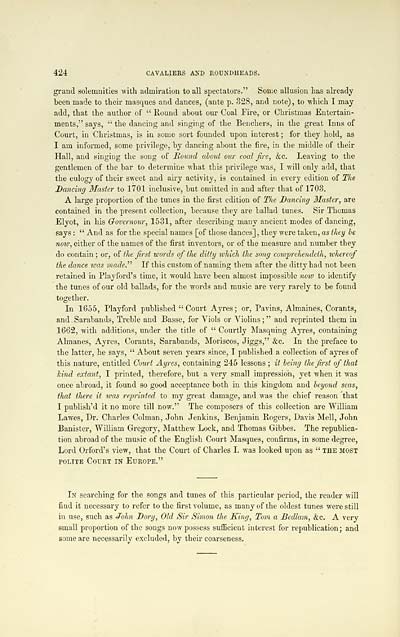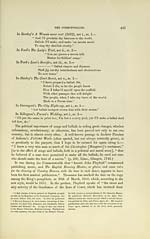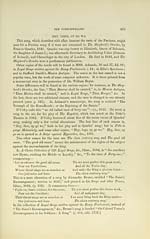Glen Collection of printed music > Printed text > Popular music of the olden time > Volume 2
(48) Page 424
Download files
Complete book:
Individual page:
Thumbnail gallery: Grid view | List view

424 CAVALIERS AND ROUNDHEADS.
grand solemnities -with admiration to all spectators." Some allusion has already
been made to their masques and dances, (ante p. 328, and note), to which I may
add, that the author of " Round about our Coal Fire, or Christmas Entertain-
ments," says, " the dancing and singing of the Benchers, in the great Inns of
Court, in Christmas, is in some sort founded upon interest ; for they hold, as
I am informed, some privilege, by dancing about the fire, in the middle of their
Hall, and singing the song of Round about our coal fire, &c. Leaving to the
gentlemen of the bar to determine what this privilege was, I will only add, that
the eulogy of their sweet and airy activity, is contained in every edition of The
Dancing Master to 1701 inclusive, but omitted in and after that of 1703.
A large proportion of the tunes in the first edition of The Dancing Master, are
contained in the present collection, because they are ballad tunes. Sir Thomas
Elyot, in his Q-overnour, 1531, after describing many ancient modes of dancing,
says : " And as for the special names [of those dances] , they were taken, as they be
noio, either of the names of the first inventors, or of the measure and number they
do contain ; or, of the first words of the ditty which the song comprehendeth, tvhereof
the dance was made." If this custom of naming them after the ditty had not been
retained in Playford's time, it would have been almost impossible noiv to identify
the tunes of our old ballads, for the words and music are very rarely to be found
together.
In 1655, Playford published " Court Ayres; or, Pavins, Almaines, Corants,
and Sarabands, Treble and Basse, for Viols or Violins ; " and reprinted them in
1662, with additions, under the title of " Courtly Masquing Ayres, containing
Almanes, Ayres, Corants, Sarabands, Moriscos, Jiggs," &c. In the preface to
the latter, he says, " About seven years since, I published a collection of ayres of
this nature, entitled Court Ayres, containing 245 lessons ; it being the first of that
kind extant, I printed, therefore, but a very small impression, yet when it was
once abroad, it found so good acceptance both in this kingdom and beyond seas,
that there it was reprinted to my great damage, and was the chief reason that
I publish'd it no more till now." The composers of this collection are William
Lawes, Dr. Charles Colman, John Jenkins, Benjamin Rogers, Davis Mell, John
Banister, William Gregory, Matthew Lock, and Thomas Gibbes. The republica-
tion abroad of the music of the English Court Masques, confirms, in some degree,
Lord Orford's view, that the Court of Charles I. was looked upon as " the most
polite Court in Europe."
In searching for the songs and tunes of this particular period, the reader will
find it necessary to refer to the first volume, as many of the oldest tunes were still
in use, such as John Dory, Old Sir Simon the King, Tom a Bedlam, &c. A very
small proportion of the songs now possess sufficient interest for republication; and
some are necessarily excluded, by their coarseness.
grand solemnities -with admiration to all spectators." Some allusion has already
been made to their masques and dances, (ante p. 328, and note), to which I may
add, that the author of " Round about our Coal Fire, or Christmas Entertain-
ments," says, " the dancing and singing of the Benchers, in the great Inns of
Court, in Christmas, is in some sort founded upon interest ; for they hold, as
I am informed, some privilege, by dancing about the fire, in the middle of their
Hall, and singing the song of Round about our coal fire, &c. Leaving to the
gentlemen of the bar to determine what this privilege was, I will only add, that
the eulogy of their sweet and airy activity, is contained in every edition of The
Dancing Master to 1701 inclusive, but omitted in and after that of 1703.
A large proportion of the tunes in the first edition of The Dancing Master, are
contained in the present collection, because they are ballad tunes. Sir Thomas
Elyot, in his Q-overnour, 1531, after describing many ancient modes of dancing,
says : " And as for the special names [of those dances] , they were taken, as they be
noio, either of the names of the first inventors, or of the measure and number they
do contain ; or, of the first words of the ditty which the song comprehendeth, tvhereof
the dance was made." If this custom of naming them after the ditty had not been
retained in Playford's time, it would have been almost impossible noiv to identify
the tunes of our old ballads, for the words and music are very rarely to be found
together.
In 1655, Playford published " Court Ayres; or, Pavins, Almaines, Corants,
and Sarabands, Treble and Basse, for Viols or Violins ; " and reprinted them in
1662, with additions, under the title of " Courtly Masquing Ayres, containing
Almanes, Ayres, Corants, Sarabands, Moriscos, Jiggs," &c. In the preface to
the latter, he says, " About seven years since, I published a collection of ayres of
this nature, entitled Court Ayres, containing 245 lessons ; it being the first of that
kind extant, I printed, therefore, but a very small impression, yet when it was
once abroad, it found so good acceptance both in this kingdom and beyond seas,
that there it was reprinted to my great damage, and was the chief reason that
I publish'd it no more till now." The composers of this collection are William
Lawes, Dr. Charles Colman, John Jenkins, Benjamin Rogers, Davis Mell, John
Banister, William Gregory, Matthew Lock, and Thomas Gibbes. The republica-
tion abroad of the music of the English Court Masques, confirms, in some degree,
Lord Orford's view, that the Court of Charles I. was looked upon as " the most
polite Court in Europe."
In searching for the songs and tunes of this particular period, the reader will
find it necessary to refer to the first volume, as many of the oldest tunes were still
in use, such as John Dory, Old Sir Simon the King, Tom a Bedlam, &c. A very
small proportion of the songs now possess sufficient interest for republication; and
some are necessarily excluded, by their coarseness.
Set display mode to: Large image | Transcription
Images and transcriptions on this page, including medium image downloads, may be used under the Creative Commons Attribution 4.0 International Licence unless otherwise stated. ![]()
| Special collections of printed music > Glen Collection of printed music > Printed text > Popular music of the olden time > Volume 2 > (48) Page 424 |
|---|
| Permanent URL | https://digital.nls.uk/91362570 |
|---|
| Shelfmark | Glen.254a |
|---|---|
| Additional NLS resources: | |
| Attribution and copyright: |
|
| Description | Scottish songs and music of the 18th and early 19th centuries, including music for the Highland bagpipe. These are selected items from the collection of John Glen (1833 to 1904). Also includes a few manuscripts, some treatises, and other books on the subject. |
|---|
| Description | The Glen Collection and the Inglis Collection represent mainly 18th and 19th century Scottish music, including Scottish songs. The collections of Berlioz and Verdi collected by bibliographer Cecil Hopkinson contain contemporary and later editions of the works of the two composers Berlioz and Verdi. |
|---|

